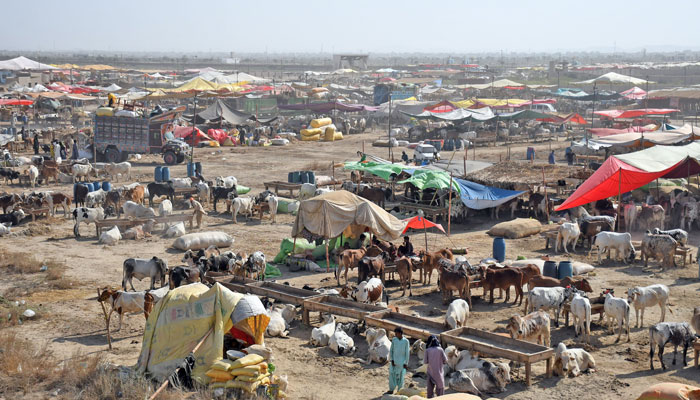High-priced cattle market auctions turn Eid into a burden for citizens
Rawalpindi:The Rawalpindi Cantonment Board (RCB), in collaboration with powerful contractors, has turned the sacred occasion of Eidul Azha into a commercial venture, making it increasingly difficult for the general public to fulfill their religious obligations. The auction of cattle markets in cantonment areas has transformed this Islamic festival into a profit-making exercise, burdening citizens already struggling with inflation.
This year, the RCB auctioned the largest cattle market in the twin cities—located at Bhatta Chowk—for a record Rs165.7 million. This is Rs55.8 million higher than last year’s winning bid of Rs109.9 million. The winning bidder, Moin Khan (Token No. 3), secured the contract in a process that RCB claims was transparent, with 24 participants competing.
Despite the RCB's assertions of fairness, the financial burden of this high auction price is ultimately being passed on to the public. Entry fees have been fixed at Rs3,000 per animal, whether large or small, for those bringing livestock for sale. Residents fear this will only push up prices further for sacrificial animals ahead of Eid.
In stark contrast, cattle markets operating under Punjab government jurisdiction remain tax-free, earning public praise for Chief Minister Maryam Nawaz. Buyers and sellers are questioning why RCB and Chaklala Cantonment Board (CCB) continue to flout Punjab government’s orders to make cattle markets tax-exempt.
Adding to public anger is the situation in Rawat, where the cattle market—also under the control of the Cantonment Board Management (CBM)—has become a hotspot for exploitation. Private contractors, reportedly backed by musclemen, are illegally collecting a 7–10% commission from both buyers and sellers. Despite clear directives from the Punjab Home Department to keep markets tax-free, no action has been taken by the local administration or cantonment authorities.
According to a survey by ‘The News’, the average price of a goat now starts at Rs70,000, and cows at Rs250,000—prices out of reach for most middle- and low-income families. This spike is largely attributed to the high cost of market auctions and unchecked profiteering by private contractors. Muhammad Bashir, a concerned citizen, said, “I appeal to the authorities to intervene, ensure price controls, and prevent exploitation in these markets. The spirit of Eid is about compassion, sacrifice, and sharing—not profit and greed.”
Buyers in Rawat have voiced their frustration, as arguments and even physical brawls have erupted over the illegal collection of taxes. Meanwhile, officials from RCB, CCB, and Potohar Town have remained silent, refusing to clarify who authorized the contracts for the Rawat market—contractors claim they’ve paid huge sums to the Cantonment Board Management for permission.
Shah Muhammad, another buyer, stressed the need for reform, “All cattle markets should be tax-free. Auctions should be abolished, and the Cantonment Board should facilitate sellers, not exploit them. I request higher authorities to take immediate action against this powerful mafia.”
People from various walks of life have appealed directly to Chief of Army Staff General Asim Munir, urging him to take notice of this exploitation and ensure relief for the public on this important Islamic occasion. They demand strict action against departments and contractors openly violating government directives and causing widespread resentment.
-
 Victor Wembanyama’s Historic First Half Tops Tim Duncan, Sparks Massive NBA Reactions
Victor Wembanyama’s Historic First Half Tops Tim Duncan, Sparks Massive NBA Reactions -
 'Heartbroken' Vanessa Hudgens Mourns Death Of Her 'sweet Girl'
'Heartbroken' Vanessa Hudgens Mourns Death Of Her 'sweet Girl' -
 Sarah Ferguson’s Loyalty To Andrew Gone With ‘free’ Home And Perks
Sarah Ferguson’s Loyalty To Andrew Gone With ‘free’ Home And Perks -
 Diplo Teases Collaboration With BTS On New Album 'ARIRANG'
Diplo Teases Collaboration With BTS On New Album 'ARIRANG' -
 Cure Flu With Theses Two Golden Foods
Cure Flu With Theses Two Golden Foods -
 King Charles Delayed Taking Firm Stance Against Andrew But William Pushed Action
King Charles Delayed Taking Firm Stance Against Andrew But William Pushed Action -
 Toronto Blue Jays Roster Faces Setback With Multiple Injury Concerns
Toronto Blue Jays Roster Faces Setback With Multiple Injury Concerns -
 Demi Lovato Leaves Fans Disappointed With Unexpected Announcement
Demi Lovato Leaves Fans Disappointed With Unexpected Announcement -
 Pacers Vs Knicks Overtime Thriller Ends In Heartbreak For New York
Pacers Vs Knicks Overtime Thriller Ends In Heartbreak For New York -
 Who Owns The Ambassador Bridge? New Report Links Owner Matthew Moroun To Trump’s Threat
Who Owns The Ambassador Bridge? New Report Links Owner Matthew Moroun To Trump’s Threat -
 ICE Detention Center Plan Sparks Controversy In Maryland As Lawmakers Push Back
ICE Detention Center Plan Sparks Controversy In Maryland As Lawmakers Push Back -
 Blood Pressure Medication Recalled After Wrong Tablets Found In Bottles
Blood Pressure Medication Recalled After Wrong Tablets Found In Bottles -
 Why Ariana Grande Wants A 'tiny Mouse' To Play Her In Biopic?
Why Ariana Grande Wants A 'tiny Mouse' To Play Her In Biopic? -
 Wind Chill Returns With Brutal Cold As Polar Vortex Stalls Over Canada
Wind Chill Returns With Brutal Cold As Polar Vortex Stalls Over Canada -
 Princess Beatrice, Eugenie ‘do Not Want To Be Seen In Public’ Because Of Dad
Princess Beatrice, Eugenie ‘do Not Want To Be Seen In Public’ Because Of Dad -
 Costco $20 Rule Explained As Employee Pay Climbs Across North America
Costco $20 Rule Explained As Employee Pay Climbs Across North America




